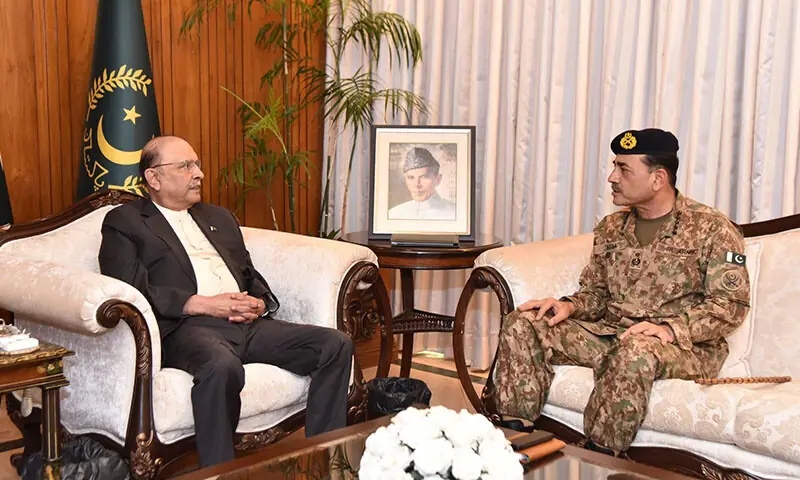
Chief of Army Staff (COAS) Field Marshal Asim Munir called on President Asif Ali Zardari at the Presidency on Wednesday, where both discussed internal and external security threats.
The meeting comes in the wake of escalating border clashes between Pakistan and Afghanistan, with security forces repelling an attack by the Afghan Taliban along the Balochistan border this morning and killing 15 to 20 fighters, the Inter-Services Public Relations (ISPR) said.
Today’s clash, the third major skirmish between Pakistan and Afghanistan within a week, follows the incident in Kurram on Tuesday night and earlier skirmishes that began on Saturday night and continued into Sunday morning at several locations.
According to a statement from the President’s Secretariat, Field Marshal Munir briefed the president on Pakistan’s overall internal and external security landscape.
“He (army chief) also apprised the president of the recent security situation arising from the aggressive and provocative actions of the Afghan Taliban regime, as well as the measured and befitting response by the Armed Forces of Pakistan,” the statement read.
It added that the president reaffirmed that Pakistan will defend its sovereignty and territorial integrity at all costs and expressed full confidence in the “strength, valour, capacity, and preparedness of Pakistan’s Armed Forces”.
President Zardari “lauded their (armed forces) vigilance and professionalism in defending the nation’s frontiers and in swiftly repelling cross-border attacks along the Afghan border”, the statement concluded.
According to the ISPR, 23 Pakistani troops were martyred and 29 injured in the weekend skirmishes which began with the Afghan Taliban attacking posts across the border.
The military’s media affairs wing also said that credible intelligence estimates and damage assessment showed that “more than 200 Taliban and affiliated terrorists have been neutralised, while the number of injured is much higher”.
Afghanistan claimed it carried out the attack as a “retaliatory” measure, accusing Islamabad of conducting air strikes in its territory last week. For its part, Islamabad did not confirm whether it was behind the air strikes but underscored Pakistan’s right and resolve to defend itself.
The weekend clash took place against the backdrop of Pakistan suffering multiple casualties among security forces in intelligence-based operations against terrorists.
Islamabad has repeatedly called on Kabul to bar terrorist groups from using its territory to attack Pakistan; however, Afghanistan denies the allegations and claims Afghan soil is not used for attacks on neighbouring countries.
The issue of terrorists using Afghan soil against Pakistan has long strained ties between the two countries and the ties seem to have nose-dived with the recent increase in hostilities at the border.

